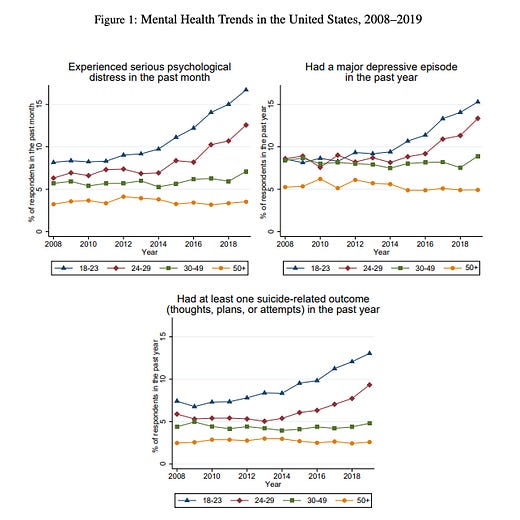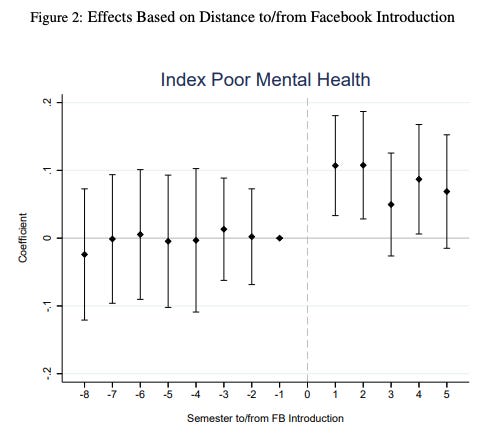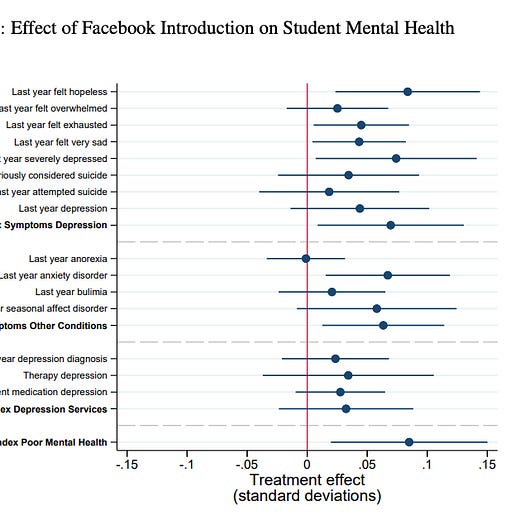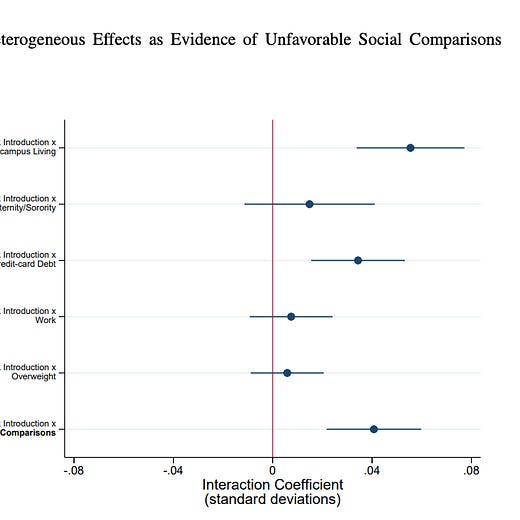Best of #econtwitter - Week of November 14, 2021 [1/2]
Nov 16, 2021
Welcome readers old and new to this week’s edition of Best of Econtwitter. Thanks to those sharing suggestions, over email or on Twitter @just_economics.
This is part one of two, this week. Part two is here.
Paper summary threads

Michael Eddy@MichaelEddy
Stunning results: ↗️ access to clean water via @EvidenceAction's Dispensers for Safe Water reduces child mortality by a stunning 63% against baseline in Kenya. Very cost-effective
This per a new 📄 by @jhaushofer @brandonjoeltan Maertens & Michael Kremer nber.org/papers/w29447

6:19 AM · Nov 8, 2021
69 Reposts · 155 Likes
^“Chlorine dispensers from @EvidenceAction appear to save a life for every $2,000 spent on them”

Eric Neyman@ericneyman
I just finished two papers that I'd been working on for a while! I'll preview the other one tomorrow, but today:
"Are You Smarter Than a Random Expert? The Robust Aggregation of Substitutable Signals", with my advisor @algoclass (Tim Roughgarden) 🧵/20
arxiv.org/abs/2111.03153
6:46 PM · Nov 8, 2021
5 Reposts · 47 Likes

Mateus Souza@mateusmeirelle6
Thrilled that our paper has been accepted at REStat! Joint work with the amazing @pa_christensen , @pwfBldgIAQ , and @EricaMyersEcon.
We provide insight into why savings from energy efficiency programs are often lower than expected.
Thread below!
#EconTwitter #energy
1/11

The Review of Economics and Statistics (REStat) @restatjournal
Decomposing the Wedge Between Projected and Realized Returns in Energy Efficiency Programs. Just Accepted new paper by Peter Christensen, Paul Francisco, Erica Myers, and Mateus Souza. https://t.co/evDdeoY2qi https://t.co/W72Hns6vm4
4:07 PM · Nov 9, 2021
13 Reposts · 83 Likes

Alice Evans@_alice_evans
Was Spain’s sex ratio once as severe as India’s?
108.8 boys per hundred girls during 19th century? 🤯
(which is precisely the same as India today)
And why did it change? https://t.co/kMnbBBm3lc


Fran Beltrán @FJBeltranTapia
Happy to share our paper with @FranMarcoGracia Parish records from a rural area in NE Spain show that families neglected a significant fraction of their newborn daughters at least until the end of the 19th c. Thread summarising the main results (1/n) 👇🏼👇🏼 https://t.co/dvCw0Gbrk3
3:32 AM · Nov 11, 2021
3 Reposts · 20 Likes
^more on gender this week: male vs. female Facebook interests; gender differences in economics networks

Pascal Paul@pascalpaul
What’s the effect of monetary policy on people’s consumption, income, saving? Recent HANK models provide valuable theoretical insights, but empirical evidence remained scarce. We therefore use detailed administrative data from Norway to address this question. (2/N)
6:46 PM · Nov 11, 2021
1 Like

Francesco Bianchi@Francesco_Bia
We find that congress members systematically affect asset prices through social media. Supportive (critical) tweets increase (decrease) the stock prices of the targeted firms. Stock prices react within minutes around the tweet and keep reacting for several days

6:09 PM · Nov 14, 2021
1 Repost · 4 Likes

Journal of Public Economics@JPubEcon
What are the effects of remedial courses in middle school?
An RD design shows positive effects on the likelihood of taking college credit-bearing courses in high school, college enrollment, enrolling in more selective colleges, persistence in college, and degree attainment.

3:21 PM · Nov 11, 2021
2 Reposts · 4 Likes

Arpit Gupta@arpitrage
Social networks inherently affect the *entire* community, and so harms are not always concentrated on the people who use it most.
Design here looks at introduction of FB for *whole* University; finding negative mental health consequences through the social comparison channel.





Daniel Willingham @DTWillingham
New quasi-experimental data: the rollout of Facebook at individual colleges coincided with increased mental health problems, esp. depression. https://t.co/HGSle2sPZ5 https://t.co/uA27F8gcEz
11:06 PM · Nov 14, 2021
8 Reposts · 45 Likes
^good discussion in the replies

Carl Benedikt Frey@carlbfrey
Six tech hubs (San Francisco, Boston, Seattle, San Diego, Denver, and Austin) account for 45% of US software patents since 2015
nber.org/papers/w29456?…

9:38 AM · Nov 8, 2021
3 Reposts · 6 Likes
Job market papers

Nozomi Nakajima@nozominaka
New working paper: “Evidence-Based Decisions and Education Policymakers”
nozominakajima.github.io/files/nakajima…
In a series of experiments, I study how education policymakers in the U.S. use research evidence to inform their decisions.
A summary 🧵 [1/N]
nozominakajima.github.io
8:59 PM · Nov 8, 2021
193 Reposts · 672 Likes

Nozomi Nakajima@nozominaka
Here's a figure of the main result:
- Policymakers place more weight on bigger studies. They prefer larger samples and more sites.
- Policymakers place more weight on studies conducted in places with similar racial composition and poverty rates as their own jurisdiction. [6/N]

8:59 PM · Nov 8, 2021
11 Reposts · 74 Likes
^understated commentary: “This is surprising because all else equal, experimental designs are less susceptible to threats of internal validity than observational studies”

elisa facchetti@elisa_facchetti
My JMP studies the multi-dimensional effects of police funding cuts in London on crime, police performance and house prices.
The massive austerity cuts forced the police to close >70% police stations since 2010.
The closures reduced police presence near closed stations 👮♂️🚓 2/N
7:44 PM · Nov 8, 2021
1 Repost · 4 Likes

Nageeb Ali@SNageebAli
🚨🚨🚨
@xiaolin_econ is on the job market this year, and his remarkable job market paper "Credible Persuasion" (co-authored with Ce Liu) is available for public viewing.
Link here: personal.psu.edu/xul75/papers/J…
and thread below.
1/7

12:01 PM · Nov 11, 2021
8 Reposts · 30 Likes
Interesting discussions

Jason Furman@jasonfurman
Two models for inflation:
1. MACRO: inflation is determined in aggregate (e.g., total stimulus).
2. MICRO: developments in individual markets (e.g., cars) determine inflation.
The later approach isn't entirely irrelevant but vastly overblown in analyzing inflation.
A 🧵
7:55 PM · Nov 11, 2021
142 Reposts · 570 Likes

Shengwu Li@ShengwuLi
It’s the season to post job-market papers.
1. JMPs are working papers. As with all working papers, they should be open to public discussion and critique.
2. There’s every reason to be civil and generous when discussing JMPs, especially since the author is stressed and busy.
8:46 PM · Nov 13, 2021
36 Reposts · 414 Likes
^some discussion here

Lavar Edmonds@lavaredmonds
Question out into the ether: How do people find co-authors? More relevant down the road, but, as a fairly introverted person who enjoys working alone but also sees the value in comp advantages/returns to multi-person problem solving, it’s something I think about from time to time
7:25 PM · Nov 15, 2021
4 Reposts · 80 Likes

Alvin Christian@_AlvinChristian
sociology is gossip with descriptive statistics
4:47 AM · Nov 12, 2021
180 Reposts · 866 Likes

Pietro Biroli@pietrobiroli
Economics is sociology, badly explained with fake math

Alvin Christian @_AlvinChristian
sociology is gossip with descriptive statistics
7:26 AM · Nov 13, 2021
310 Reposts · 1.67K Likes

